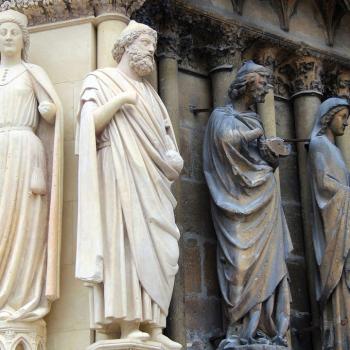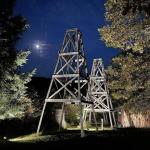Left Behind, pg. 256
Unlike Buck, the other journalists present at the United Nations actually file stories on Nicolae Carpathia's speech and press conference, turning the Romanian president into a media superstar:
By the time of the evening network news, a new international star had been born. He even had a nickname: Saint Nick. More than sound bites had been taken from the floor of the U.N. and the press conference. Carpathia enjoyed several minutes on each telecast, rousing the U.N. audience with the recitation of countries, urgently calling for a recommitment to world peace. …
The news broadcasts didn't offer mere "sound bites" from Carpathia's speech because it didn't contain any sound bites. The guy recited lists of countries, agencies and secretaries general. It's hard to imagine some news producer telling her editors, "Be sure we use that bit about U Thant — that's what everyone will be talking about tomorrow at the water cooler." Then again, it's hard to imagine any news producer caring a whit about a U.N. speech by the president of Romania, even on the slowest of slow news days. And since there's still no trace of every child on the planet and still no full accounting yet for how many and who all is among the disappeared, this wouldn't seem to be a slow news day. (Just think of what CNN would like following the disappearance of hundreds of thousands of white women.)
But set aside the unprecedented context of The Event and its aftermath. The president of Romania giving a speech at the United Nations, about the United Nations, wouldn't make the paper if it happened today, let alone the network news. Speeches at the U.N., even by national leaders, just aren't that big a deal. They might make the news if they include something newsworthy — like Hugo Chavez's "smells like Bush was here" shtick — but generally speaking, they're not news.
I understand that LaHaye and Jenkins have their own peculiar perspective on the United Nations, but you'd think they might have noticed, if they've ever watched the nightly news, that such broadcasts do not usually begin with even sound-bite coverage of speeches there. The media attention Carpathia is getting would make slightly more sense if he had spoken, instead, before a joint session of Congress in Washington, but L&J have studiously avoided any mention of the American government and how it might be responding to The Event. LaHaye lives in southern California and Jenkins lives in Colorado, but quite honestly they don't seem to occupy the same planet that the rest of us live on.
He had carefully avoided specific talk of global disarmament. His was a message of love and peace and understanding and brotherhood, and to quit fighting seemed to go without saying. No doubt he would be back to hammer home that point, but in the meantime, Carpathia was on the charmed ride of his life.
Speaking of hammering home one's point, L&J remind their readers here, yet again, that anyone with "a message of love and peace and understanding and brotherhood" should be viewed with suspicion. That's the language of the Antichrist, after all, the language of evil. This is not a minor point in Left Behind and I suspect it's one that many of their 60 million+ readers have absorbed. (I wouldn't be at all surprised to find a close correlation between that readership and the 29 percent of Americans who believe the war in Iraq is going well.)
L&J's insistence that the Antichrist be a promoter of peace and disarmament is part of what lends an unreality to the whole narrative of Carpathia's rise to power. Post-Event the world would be in chaos, chaos that would extend even to the personal, existential level — those left behind have just witnessed the erasing of the boundary between being and non-being. With the population traumatized, desperate for answers and direction, the situation would be ripe for dictators to seize power by declaring martial law, restoring order with an iron hand. The Post-Event rise of global dictatorship practically writes itself. But L&J instead present a scenario in which Carpathia rises to power on the basis of little more than utopian appeals for cooperation as chaos flowers into peaceful order. (I suppose, again, that if this scenario seems plausible to you, you might really think the war in Iraq is going well.)
The authors follow some strange twists of logic to arrive at the idea that "love and peace and unity and brotherhood" is the message of the Antichrist. The idea seems to have its roots in the biblical warnings against false Christs, passages like Matthew 24:4-5, "Watch out that no one deceives you. For many will come in my name, claiming, 'I am the Christ,' and will deceive many." For these impostors to "deceive many," their claims must seem plausible, so they must talk like Jesus. A false Christ, in other words, would likely talk about the same things that Jesus Christ talked about — love and peace and understanding and brotherhood. But this talk will be fraudulent, the false Christ wouldn't really mean any of it.*
Somehow L&J seem to have lost sight of the fact that the words of such frauds should not be taken at face value. (I think this is partly due to their reflexive antagonism against "works righteousness," which leads them to emphasize words over deeds.) They are not on the lookout against the deceptions of disingenuous false leaders, but rather against anyone with a message of love and peace and understanding and brotherhood. They've gotten so caught up in guarding against wolves in sheep's clothing that anything in sheep's clothing is viewed as the enemy. So all sheep must be shot on sight.
Follow the logic. Once you've decided that the Most Important Thing is to avoid the wolf in sheep's clothing, your safest course of action is to embrace the wolf in wolf's clothing.
Apply this logic to vigilance against the Antichrist. We "know" the Antichrist will come claiming to favor LPU&B. Now imagine we are faced with a choice between two leaders. The first advocates LPU&B, but the second, instead, favors the opposite — hate, war, dissension and enmity. From LaHaye and Jenkins' perspective, we should choose the second leader, because we know he's not the Antichrist. The first one might be (or, at least, he might be an unwitting tool of the one-world government conspiracy that will eventually be led by the Antichrist).
Anyone who talks about love, peace, unity or brotherhood might be the Antichrist, so anyone who speaks of such things must be rejected.
Through books like LB and through the vast network of "Bible prophecy" seminars, newletters and radio hosts, tens of millions of Americans have been taught to think like this. Consider how you might go about energizing such voters if you thought of them as your "base" of electoral support.
– – – – – – – – – – – –
* The most extensive discussion of such false Christs is found in 1 John, which also introduces us to the term "Antichrist." (John actually speaks of "antichrists" — plural — and the term is not found anywhere else in the Bible, not in Revelation or any of the other apocalyptic passages favored by PMDs.)
John's first epistle is all about recognizing and avoiding what he calls "the spirit of the antichrist," and it's chock full of blunt, stark statements on the topic, such as this from Chapter 4: "If anyone says, 'I love God,' yet hates his brother, he is a liar. For anyone who does not love his brother, whom he has seen, cannot love God, whom he has not seen." For John, in other words, actual "love and peace and unity and brotherhood" are the hallmarks of genuine faith.
















